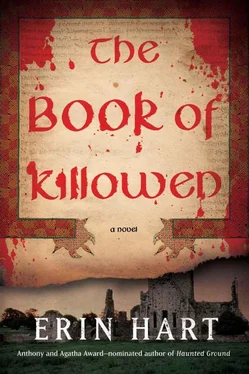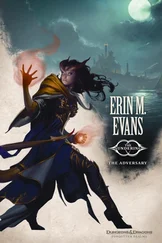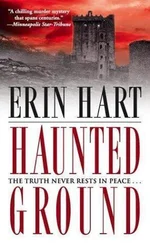Cormac glanced up to see Eliana peering around the doorjamb, fist pressed to her lips as if she were afraid of crying out, silent tears streaming down her face. Nora stood behind her.
“You knew,” he said to Eliana. “That’s why you came to us. You came looking for my father because you knew that he was—”
The girl nodded.
Nora took Eliana’s hand and led her into the small room as Cormac cleared a spot beside his father on the bed. He drew the two chairs closer. The whole scene was so unreal.
Eliana had to take a moment to compose herself before speaking. “I didn’t know anything about that agency you rang about a minder. I only happened to come to your house on that day, and you said we were going to Tipperary. That we would be in time for lunch. And so I came along. I wanted to tell you, all the time, but I was afraid.”
Cormac shook his head. “That doesn’t matter now. What I want to know is, how did you find us?”
“It is a strange, sad story. I think you know I’m not from Spain. I was born in Uruguay, in 1984. I have no memory of another place, but I always felt as if I… didn’t belong. I never knew why until the man I called my father, he was very ill, dying. It was not so long ago. He asked me to bring him a book. I can never forget this book— Los Años del Lobo —it was about all that happened so long ago in Uruguay, in Argentina, and Chile—and this man, my father, he asked me to forgive him.”
Eliana took a breath and continued. “After he died, my mother—the woman I called my mother—she finally told the truth, that I was not her child. She knew no more than that. But then a few months later, I received a visit from a priest. He said someone was looking for me, a woman in Chile. That this woman was mi abuela , my grandmother.”
Joseph’s expression changed. “Vee-veelet,” he said, becoming agitated.
“Yes, you know her, Violeta Mendes-García. She loved you as her son, and she sent me here, to find you. Because she always believed that my mother was eh—” She gestured, giving herself a round belly. “How do you say embarazada ?”
“Pregnant?” Nora asked.
“Yes, yes, pregnant when she was taken. No one knew but mi abuela .” Eliana turned to the old man, who crumpled slightly and let out a low groan, the terrible knowledge like a dull spike to the heart. “How could you know? And mi abuela , she said she could not punish you that way. What if my mother had been killed, and there was no child? But she could not stop, she had to know. It’s strange to think now, but the people in charge, they kept such good records of their prisoners, of all the people they killed. And so my grandmother found my mother’s name in the secret files of the military hospital in Montevideo. She found a man there also who remembered my mother and how he was told to put her child into a basket and to bring that basket to the wife of a policeman, a woman who had no children of her own.”
Joseph closed his eyes. “Cóndor,” he murmured.
“Sí,” Eliana replied. “Operación Cóndor.”
Cormac felt a knot under his rib cage. Twenty years after it ended, the whole world knew of Operation Condor. About the torture and the killings, the kidnapped children of the “disappeared,” who were robbed of their families, their very identities.
“When did all this happen, Eliana? I mean, when did your grandmother find you?”
“Three years ago. But still we didn’t know the truth, not for certain. The man in the hospital, he could have lied or made a mistake. And so I went for a test, ADN, which you call by something else, I think—”
“DNA,” Nora said.
“DNA, yes.” She turned to the old man, gripped his hand. “That’s when I knew, when I could be certain. Yo soy su hija .”
The old man’s fingertips reached out and barely brushed her face. When he finally spoke, his voice was hoarse: “He soñado—contigo.”
“And I have dreamed of you also, papá —” Eliana broke off, unable to speak. Her eyes locked on the old man’s, and his on hers, and upon that thread hung a look of such infinite joy and desolation that Cormac felt his own heart might crack.
Eliana managed to smile through her tears. “How strange it is, to feel at once so full and yet so empty still.”
Cormac could bear to look no longer. He turned away. The earth itself had broken open, the continents shifted, and nothing would ever be the same.
Stella Cusack snapped into action when she returned home from the wake, pegging all the dirty delft straight into the dishwasher, picking up the sheets she’d stripped from her bed and bundling them into the washing machine. She knew that it was only a feeble attempt to erase all imprints, all residues of Fergal Molloy, but it was the best she could manage right now. She sat on a chair, watching the water sloshing around inside the machine and sobbing like a child.
When the cycle finished, she sat in the silent kitchen, staring at the mobile phone resting on the table before her. She was trying to screw up her courage—time to ring her daughter, see if they could talk things over before it was too late.
Stella reached for the phone and flinched as it began to buzz and vibrate on the table. The blue window said “Cusack.” She punched a button to answer.
“Stella, it’s me.” He’d always been on to her that way, ever since she’d known him. It’s me. As if he were the only possible me . “It’s Barry.”
But something was up. She picked up on a subtle difference in the sound of his voice, a note of something—was it regret?—that she had never heard before.
“Barry, where are you?”
He hesitated. “Outside.”
She found him standing in the shadows, wearing his olive-green mac, even though the sky was clear. “Thanks. Didn’t want people to think you had a stalker.” He glanced sideways at the twitch of a curtain at the neighbors’ window. “Can I come in?” She turned and walked away, leaving the door open. He stepped into the foyer but didn’t remove his coat.
“What is it, Barry? What do you need?”
He seemed insulted. “Do I have to need something to come and talk to you? Why do you—” He closed his eyes and stopped himself from saying any more.
“Whatever it is, Barry, just say it and get it over with. We need to talk about Lia.”
He looked so awkward and miserable, standing in the middle of the foyer with his raincoat on, that Stella found herself beginning to take pity on him.
“Take your coat off, then. Do you need a drink? I know I do.”
“I wouldn’t mind, if you’ve got something. That’s one of the things I miss, just having a drink with you, Stella.” He was looking at her strangely as he peeled off the mac and draped it over the back of the sofa.
She’d crossed to the liquor cabinet and was pouring out a couple of short glasses of whiskey when she felt Barry standing behind her. So close that she could smell him, could feel his warm breath against her hair.
“Where’s Allison tonight?” she asked, her own breath coming fast and shallow.
Barry didn’t respond, just slipped his hands around her shoulders. “Stella—”
She turned, seizing the two glasses and ducking under his arm in one motion, before he could react. She shoved one of the glasses into his hand as she passed.
Barry squinted at her in puzzlement. She could almost hear the gears turning inside his skull. They were both adults. What was the point of denying physical need? And besides which, hadn’t he got lucky here just a couple of weeks ago?
Stella took a sip of the whiskey to steady herself. “Well, since you won’t tell me what you want, I’ll tell you what I need: Lia home with me, now. I want her to stop playing us. She knows exactly how to get what she wants, and we both know she’s better off here. We also know that you can’t keep this up forever, the whole engaged father act. It’s been what—four whole days now? That’s got to be getting old.”
Читать дальше












